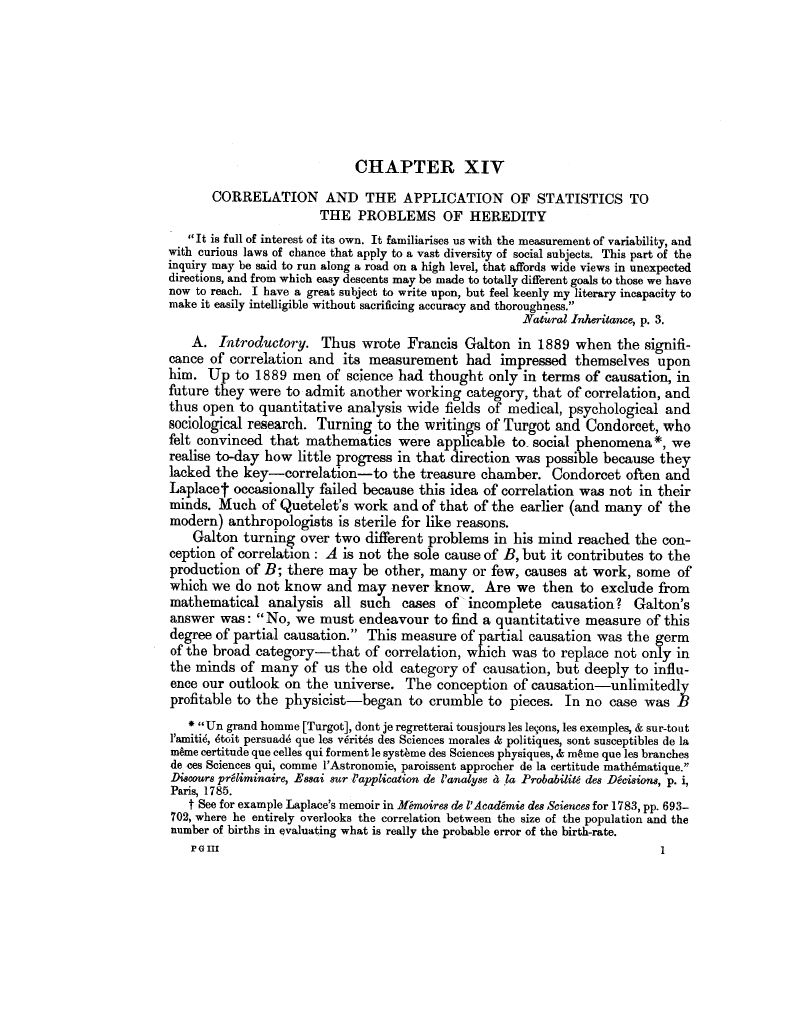| ||||||

OCR Rendition - approximate
CHAPTER XIV CORRELATION AND THE APPLICATION OF STATISTICS TO THE PROBLEMS OF HEREDITY "It is full of interest of its own. It familiarises us with the measurement of variability, and with curious laws of chance that apply to a vast diversity of social subjects. This part of the inquiry may be said to run along a road on a high level, that affords wide views in unexpected directions, and from which easy descents may be made to totally different goals to those we have now to reach. I have a great subject to write upon, but feel keenly my literary incapacity to make it easily intelligible without sacrificing accuracy and thoroughness." Natural Inheritance, p. 3. A. Introductory. Thus wrote Francis Galton in 1889 when the significance of correlation and its measurement had impressed themselves upon him. Up to 1889 men of science had thought only in terms of causation, in future they were to admit another working category, that of correlation, and thus open to quantitative analysis wide fields of medical, psychological and sociological research. Turning to the writings of Turgot and Condorcet, who felt convinced that mathematics were applicable to. social phenomena*, we realise to-day how little progress in that direction was possible because they lacked the key-correlation-to the treasure chamber. Condorcet often and Laplacet occasionally failed because this idea of correlation was not in their minds. Much of Quetelet's work and of that of the earlier (and many of the modern) anthropologists is sterile for like reasons. Galton turning over two different problems in his mind reached the conception of correlation : A is not the sole cause of B, but it contributes to the production of B; there may be other, many or few, causes at work, some of which we do not know and may never know. Are we then to exclude from mathematical analysis all such cases of incomplete causation? Galton's answer was: "No, we must endeavour to find a quantitative measure of this degree of partial causation." This measure of partial causation was the germ of the broad category-that of correlation, which was to replace not only in the minds of many of us the old category of causation, but deeply to influence our outlook on the universe. The conception of causation-unlimitedly profitable to the physicist-began to crumble to pieces. In no case was B * "Un grand homme [Turgot], dont je regretterai tousjours les lecons, les exemples, & sur-tout 1'amitie, etoit persuade que les verites des Sciences morales & politiques, sont susceptibles de la meme certitude que celles qui forment le systeme des Sciences physiques, & meme que les branches de ces Sciences qui, comme I'Astronomie, paroissent approcher de la certitude mathematique." Discours preliminaire, Essai sur l'application de l'analyse a la Probabilite des Decisions, p. i, Paris, 1785. t See for example Laplace's memoir in Memoires de l'Academie des Sciences for 1783, pp. 693702, where he entirely overlooks the correlation between the size of the population and the number of births in evaluating what is really the probable error of the birth-rate. P G III 1
|